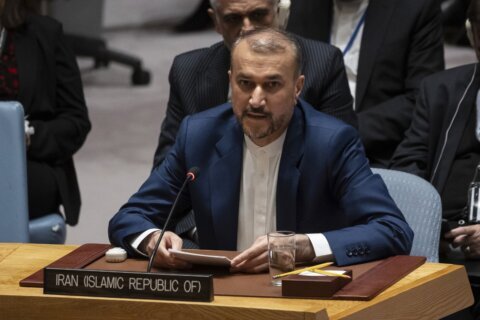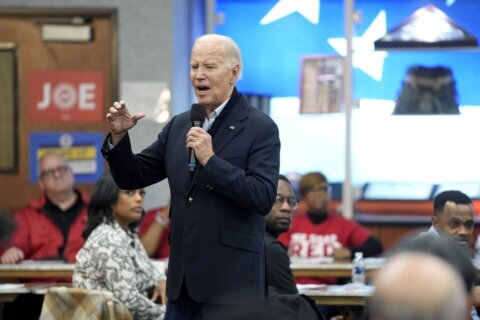CAIRO (AP) — Egypt’s prime minister visited Libya’s capital Tuesday to discuss trade and other ties with the newly appointed government, his office said.
Prime Minister Mustafa Madbouly is the most senior Egyptian official to visit Libya since the oil-rich country plunged into chaos in 2011. A NATO-backed uprising that year toppled longtime ruler Moammar Gadhafi, who was later killed.
Madbouly landed at Tripoli’s Mitiga International Airport with 11 members of his Cabinet and trade and industry officials, his office said in a statement. He then met with Libya’s Prime Minister Abdul Hamid Dbeibah.
Dbeibah told a joint news conference that they inked a dozen deals on electricity, telecommunications, infrastructure, health and education. He called for Egypt to resume direct flights between Libyan cities and the Egyptian capital and to reopen its embassy in Tripoli, which has been closed the past five years because of the chaos there.
“We discussed at this stage the restoration of economic, social and political ties,” Madbouly said. “We value all the steps that the Libyan state has successfully taken (to implement the political) roadmap and (to achieve) reconciliation between all Libyan sects.”
Meanwhile, United Nations Secretary-General Antonio Guterres, Arab League Secretary General Ahmed Aboul Gheit and high-level representatives of the European Union and the African Union commission met virtually Tuesday to talk about Libya. They “strongly welcomed the significant progress towards advancing an inclusive and comprehensive political solution,” according to a joint statement.
Madbouly’s visit comes after an interim government took power in Libya last month aimed at holding elations in the North African country in December after a decade of fighting and upheaval.
That interim government includes a three-member Presidential Council and a Cabinet headed by Dbeibah. Its appointment in February under a U.N.-led process has revived hopes of stability in oil-rich Libya.
Egypt President Abdel Fattah el-Sissi received Dbeibah in Cairo in February. He stressed “his eagerness to support the Libyan people” on the road to stability and offered to share Egypt’s expertise on rolling out developmental projects to rebuild Libya’s shattered economy.
Libya was divided since 2015 between two governments, one in the east and one in the west, with each backed by an array of militias and foreign governments.
Egypt sees the chaos in neighboring Libya a threat to its stability, with militants using the Libyan desert as a safe haven and to launch deadly attacks on Egyptian security forces and Christians.
Also, tens of thousands of Egyptians have sought work in neighboring Libya over the years, although the number has declined since the 2011 uprising.
Egypt, along with Russia and the United Arab Emirates, was a key backer of eastern aligned military commander Khalifa Hifter, who had launched an offensive in 2019 to capture Tripoli from the U.N.-supported government in the west. However, Hifter’s 14-month-long campaign collapsed after Turkey and Qatar stepped up their military support for the Tripoli administration with hundreds of troops and thousands of Syrian mercenaries.
Following Hifter’s defeat, el-Sissi had threatened to intervene militarily in Libya if Turkey-backed forces marched on the strategic coastal city of Sirte, held by Hifter’s forces. Had this happened, it would have brought Egypt and Turkey — close U.S. allies that support rival sides in the conflict — into direct confrontation.
Months of U.N.-led talks resulted in a deal in October that ended hostilities and called for the withdrawal of all foreign forces and mercenaries in three months as well as adherence to a U.N. arms embargo. Those provisions have not been met.
The U.N. estimated in December there were at least 20,000 foreign fighters and mercenaries in Libya.
The U.N. and the three regional groups that met Tuesday called for full compliance with the embargo and “immediate and unconditional” departure of all foreign forces and mercenaries.
“All external military intervention in Libya is unacceptable,” said the four, known as the “Libya quartet.”
They also pressed for “a comprehensive and durable solution to the threat posed by armed groups and militias,” including a sustained effort to identify and dismantle them.
___
Associated Press writer Jennifer Peltz at the United Nations contributed to this report.
Copyright © 2024 The Associated Press. All rights reserved. This material may not be published, broadcast, written or redistributed.







